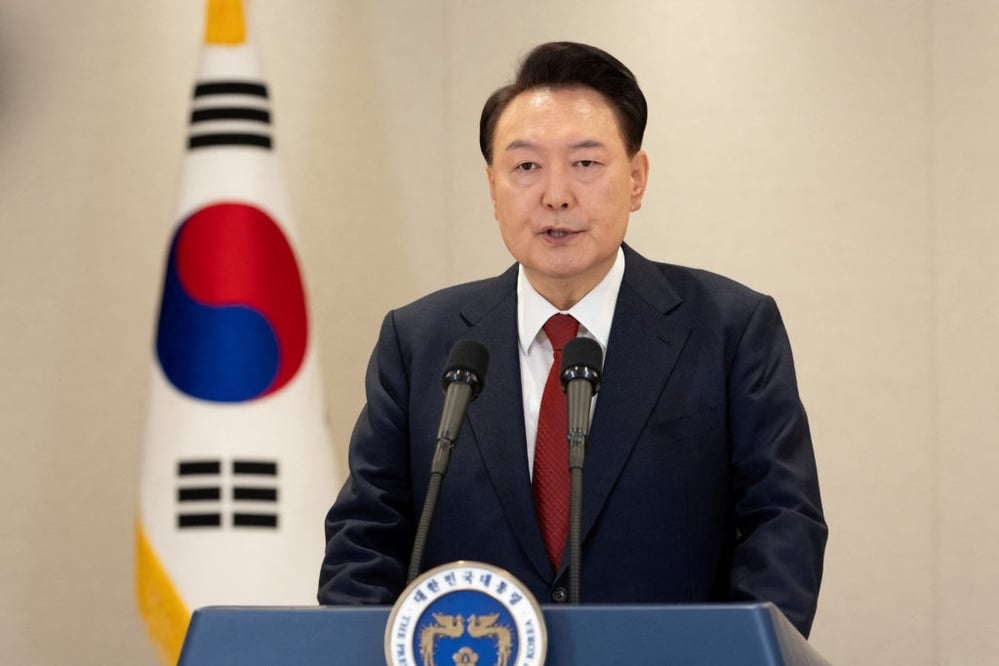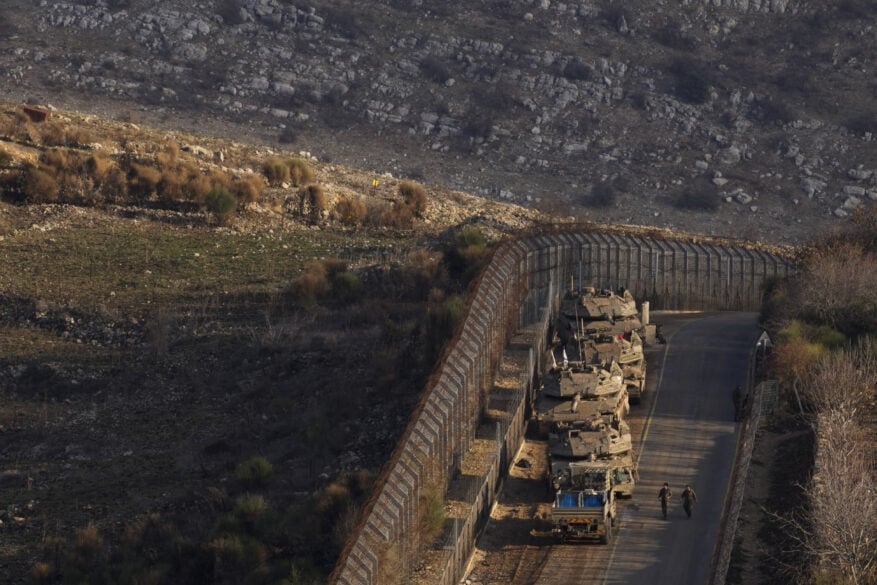
Article Bias: The article provides a factual account of the failed impeachment attempt of South Korean President Yoon Suk Yeol, emphasizing political tensions between his party and the opposition, the chaos surrounding his martial law announcement, and the potential for future impeachment efforts, thereby reflecting a mostly neutral stance without a strong ideological bias.
Social Shares: 27
🔵 Liberal <-> Conservative 🔴:
🗽 Libertarian <-> Authoritarian 🚔:
🗞️ Objective <-> Subjective 👁️ :
🚨 Sensational:
📉 Bearish <-> Bullish 📈:
📝 Prescriptive:
🕊️ Dovish <-> Hawkish 🦁:
😨 Fearful:
📞 Begging the Question:
🗣️ Gossip:
💭 Opinion:
🗳 Political:
Oversimplification:
🏛️ Appeal to Authority:
🍼 Immature:
🔄 Circular Reasoning:
👀 Covering Responses:
😢 Victimization:
😤 Overconfident:
🗑️ Spam:
✊ Ideological:
🏴 Anti-establishment <-> Pro-establishment 📺:
🙁 Negative <-> Positive 🙂:
📏📏 Double Standard:
❌ Uncredible <-> Credible ✅:
🧠 Rational <-> Irrational 🤪:
🤑 Advertising:
🤖 Written by AI:
💔 Low Integrity <-> High Integrity ❤️:
AI Bias: I aim to be neutral but may inherit biases from my training data.
Article Bias: The article presents a detailed account of the ongoing political crisis in South Korea, primarily focusing on accusations against President Yoon Suk Yeol, his attempts to impose martial law, and the subsequent upheaval, while including reactions from opposition lawmakers and public protests; overall, it maintains a descriptive tone with an emphasis on political and constitutional implications.
Social Shares: 1
🔵 Liberal <-> Conservative 🔴:
🗽 Libertarian <-> Authoritarian 🚔:
🗞️ Objective <-> Subjective 👁️ :
🚨 Sensational:
📉 Bearish <-> Bullish 📈:
📝 Prescriptive:
🕊️ Dovish <-> Hawkish 🦁:
😨 Fearful:
📞 Begging the Question:
🗣️ Gossip:
💭 Opinion:
🗳 Political:
Oversimplification:
🏛️ Appeal to Authority:
🍼 Immature:
🔄 Circular Reasoning:
👀 Covering Responses:
😢 Victimization:
😤 Overconfident:
🗑️ Spam:
✊ Ideological:
🏴 Anti-establishment <-> Pro-establishment 📺:
🙁 Negative <-> Positive 🙂:
📏📏 Double Standard:
❌ Uncredible <-> Credible ✅:
🧠 Rational <-> Irrational 🤪:
🤑 Advertising:
🤖 Written by AI:
💔 Low Integrity <-> High Integrity ❤️:
AI Bias: Neutral training data aims for balanced and factual reporting.
Article Bias: The article describes the arrest of South Korea's former defence minister in connection with President Yoon's controversial martial law attempt, highlighting the political unrest, public protests, and ongoing investigations into Yoon and his associates, indicating a critical stance towards the government actions.
Social Shares: 16
🔵 Liberal <-> Conservative 🔴:
🗽 Libertarian <-> Authoritarian 🚔:
🗞️ Objective <-> Subjective 👁️ :
🚨 Sensational:
📉 Bearish <-> Bullish 📈:
📝 Prescriptive:
🕊️ Dovish <-> Hawkish 🦁:
😨 Fearful:
📞 Begging the Question:
🗣️ Gossip:
💭 Opinion:
🗳 Political:
Oversimplification:
🏛️ Appeal to Authority:
🍼 Immature:
🔄 Circular Reasoning:
👀 Covering Responses:
😢 Victimization:
😤 Overconfident:
🗑️ Spam:
✊ Ideological:
🏴 Anti-establishment <-> Pro-establishment 📺:
🙁 Negative <-> Positive 🙂:
📏📏 Double Standard:
❌ Uncredible <-> Credible ✅:
🧠 Rational <-> Irrational 🤪:
🤑 Advertising:
🤖 Written by AI:
💔 Low Integrity <-> High Integrity ❤️:
AI Bias: Neutral perspective on political events and their implications.
Article Bias: The article provides a factual account of the failed impeachment attempt of South Korean President Yoon Suk Yeol, emphasizing political tensions between his party and the opposition, the chaos surrounding his martial law announcement, and the potential for future impeachment efforts, thereby reflecting a mostly neutral stance without a strong ideological bias.
Social Shares: 27
🔵 Liberal <-> Conservative 🔴:
🗽 Libertarian <-> Authoritarian 🚔:
🗞️ Objective <-> Subjective 👁️ :
🚨 Sensational:
📉 Bearish <-> Bullish 📈:
📝 Prescriptive:
🕊️ Dovish <-> Hawkish 🦁:
😨 Fearful:
📞 Begging the Question:
🗣️ Gossip:
💭 Opinion:
🗳 Political:
Oversimplification:
🏛️ Appeal to Authority:
🍼 Immature:
🔄 Circular Reasoning:
👀 Covering Responses:
😢 Victimization:
😤 Overconfident:
🗑️ Spam:
✊ Ideological:
🏴 Anti-establishment <-> Pro-establishment 📺:
🙁 Negative <-> Positive 🙂:
📏📏 Double Standard:
❌ Uncredible <-> Credible ✅:
🧠 Rational <-> Irrational 🤪:
🤑 Advertising:
🤖 Written by AI:
💔 Low Integrity <-> High Integrity ❤️:
AI Bias: I aim to be neutral but may inherit biases from my training data.
Article Bias: The article presents a detailed account of the ongoing political crisis in South Korea, primarily focusing on accusations against President Yoon Suk Yeol, his attempts to impose martial law, and the subsequent upheaval, while including reactions from opposition lawmakers and public protests; overall, it maintains a descriptive tone with an emphasis on political and constitutional implications.
Social Shares: 1
🔵 Liberal <-> Conservative 🔴:
🗽 Libertarian <-> Authoritarian 🚔:
🗞️ Objective <-> Subjective 👁️ :
🚨 Sensational:
📉 Bearish <-> Bullish 📈:
📝 Prescriptive:
🕊️ Dovish <-> Hawkish 🦁:
😨 Fearful:
📞 Begging the Question:
🗣️ Gossip:
💭 Opinion:
🗳 Political:
Oversimplification:
🏛️ Appeal to Authority:
🍼 Immature:
🔄 Circular Reasoning:
👀 Covering Responses:
😢 Victimization:
😤 Overconfident:
🗑️ Spam:
✊ Ideological:
🏴 Anti-establishment <-> Pro-establishment 📺:
🙁 Negative <-> Positive 🙂:
📏📏 Double Standard:
❌ Uncredible <-> Credible ✅:
🧠 Rational <-> Irrational 🤪:
🤑 Advertising:
🤖 Written by AI:
💔 Low Integrity <-> High Integrity ❤️:
AI Bias: Neutral training data aims for balanced and factual reporting.
Opposition Viewpoint
Article Bias: The article provides a factual account of the failed impeachment attempt of South Korean President Yoon Suk Yeol, emphasizing political tensions between his party and the opposition, the chaos surrounding his martial law announcement, and the potential for future impeachment efforts, thereby reflecting a mostly neutral stance without a strong ideological bias.
Social Shares: 27
🔵 Liberal <-> Conservative 🔴:
🗽 Libertarian <-> Authoritarian 🚔:
🗞️ Objective <-> Subjective 👁️ :
🚨 Sensational:
📉 Bearish <-> Bullish 📈:
📝 Prescriptive:
🕊️ Dovish <-> Hawkish 🦁:
😨 Fearful:
📞 Begging the Question:
🗣️ Gossip:
💭 Opinion:
🗳 Political:
Oversimplification:
🏛️ Appeal to Authority:
🍼 Immature:
🔄 Circular Reasoning:
👀 Covering Responses:
😢 Victimization:
😤 Overconfident:
🗑️ Spam:
✊ Ideological:
🏴 Anti-establishment <-> Pro-establishment 📺:
🙁 Negative <-> Positive 🙂:
📏📏 Double Standard:
❌ Uncredible <-> Credible ✅:
🧠 Rational <-> Irrational 🤪:
🤑 Advertising:
🤖 Written by AI:
💔 Low Integrity <-> High Integrity ❤️:
AI Bias: I aim to be neutral but may inherit biases from my training data.
Article Bias: The article provides a detailed examination of the recent political turmoil in South Korea, emphasizing the resilience of democracy amidst challenges posed by President Yoon Suk Yeol's actions, while balancing opinions from various citizens that reflect both dissatisfaction and hope for the future of democratic governance, suggesting a critical yet fair perspective on governmental issues.
Social Shares: 22
🔵 Liberal <-> Conservative 🔴:
🗽 Libertarian <-> Authoritarian 🚔:
🗞️ Objective <-> Subjective 👁️ :
🚨 Sensational:
📉 Bearish <-> Bullish 📈:
📝 Prescriptive:
🕊️ Dovish <-> Hawkish 🦁:
😨 Fearful:
📞 Begging the Question:
🗣️ Gossip:
💭 Opinion:
🗳 Political:
Oversimplification:
🏛️ Appeal to Authority:
🍼 Immature:
🔄 Circular Reasoning:
👀 Covering Responses:
😢 Victimization:
😤 Overconfident:
🗑️ Spam:
✊ Ideological:
🏴 Anti-establishment <-> Pro-establishment 📺:
🙁 Negative <-> Positive 🙂:
📏📏 Double Standard:
❌ Uncredible <-> Credible ✅:
🧠 Rational <-> Irrational 🤪:
🤑 Advertising:
🤖 Written by AI:
💔 Low Integrity <-> High Integrity ❤️:
AI Bias: My training data likely reflects a Western viewpoint on global democracy.
Public Sentiment
Article Bias: The article describes the arrest of South Korea's former defence minister in connection with President Yoon's controversial martial law attempt, highlighting the political unrest, public protests, and ongoing investigations into Yoon and his associates, indicating a critical stance towards the government actions.
Social Shares: 16
🔵 Liberal <-> Conservative 🔴:
🗽 Libertarian <-> Authoritarian 🚔:
🗞️ Objective <-> Subjective 👁️ :
🚨 Sensational:
📉 Bearish <-> Bullish 📈:
📝 Prescriptive:
🕊️ Dovish <-> Hawkish 🦁:
😨 Fearful:
📞 Begging the Question:
🗣️ Gossip:
💭 Opinion:
🗳 Political:
Oversimplification:
🏛️ Appeal to Authority:
🍼 Immature:
🔄 Circular Reasoning:
👀 Covering Responses:
😢 Victimization:
😤 Overconfident:
🗑️ Spam:
✊ Ideological:
🏴 Anti-establishment <-> Pro-establishment 📺:
🙁 Negative <-> Positive 🙂:
📏📏 Double Standard:
❌ Uncredible <-> Credible ✅:
🧠 Rational <-> Irrational 🤪:
🤑 Advertising:
🤖 Written by AI:
💔 Low Integrity <-> High Integrity ❤️:
AI Bias: Neutral perspective on political events and their implications.
Article Bias: The article provides a detailed examination of the recent political turmoil in South Korea, emphasizing the resilience of democracy amidst challenges posed by President Yoon Suk Yeol's actions, while balancing opinions from various citizens that reflect both dissatisfaction and hope for the future of democratic governance, suggesting a critical yet fair perspective on governmental issues.
Social Shares: 22
🔵 Liberal <-> Conservative 🔴:
🗽 Libertarian <-> Authoritarian 🚔:
🗞️ Objective <-> Subjective 👁️ :
🚨 Sensational:
📉 Bearish <-> Bullish 📈:
📝 Prescriptive:
🕊️ Dovish <-> Hawkish 🦁:
😨 Fearful:
📞 Begging the Question:
🗣️ Gossip:
💭 Opinion:
🗳 Political:
Oversimplification:
🏛️ Appeal to Authority:
🍼 Immature:
🔄 Circular Reasoning:
👀 Covering Responses:
😢 Victimization:
😤 Overconfident:
🗑️ Spam:
✊ Ideological:
🏴 Anti-establishment <-> Pro-establishment 📺:
🙁 Negative <-> Positive 🙂:
📏📏 Double Standard:
❌ Uncredible <-> Credible ✅:
🧠 Rational <-> Irrational 🤪:
🤑 Advertising:
🤖 Written by AI:
💔 Low Integrity <-> High Integrity ❤️:
AI Bias: My training data likely reflects a Western viewpoint on global democracy.
My Bias
Story Blindspots
Article Bias: The article provides a factual account of South Korean President Yoon's impeachment vote and the surrounding political turmoil, highlighting the failed attempt by opposition lawmakers to remove him and the significant protests calling for his ousting, without leaning towards a specific bias.
Social Shares: 40
🔵 Liberal <-> Conservative 🔴:
🗽 Libertarian <-> Authoritarian 🚔:
🗞️ Objective <-> Subjective 👁️ :
🚨 Sensational:
📉 Bearish <-> Bullish 📈:
📝 Prescriptive:
🕊️ Dovish <-> Hawkish 🦁:
😨 Fearful:
📞 Begging the Question:
🗣️ Gossip:
💭 Opinion:
🗳 Political:
Oversimplification:
🏛️ Appeal to Authority:
🍼 Immature:
🔄 Circular Reasoning:
👀 Covering Responses:
😢 Victimization:
😤 Overconfident:
🗑️ Spam:
✊ Ideological:
🏴 Anti-establishment <-> Pro-establishment 📺:
🙁 Negative <-> Positive 🙂:
📏📏 Double Standard:
❌ Uncredible <-> Credible ✅:
🧠 Rational <-> Irrational 🤪:
🤑 Advertising:
🤖 Written by AI:
💔 Low Integrity <-> High Integrity ❤️:
AI Bias: Neutral, focused on analytical assessment of content.
Article Bias: The article reports on South Korean President Yoon Suk Yeol's impeachment vote, highlighting the political turmoil surrounding his martial law declaration, the mixed public response, and the implications of the censure attempt.
The tone appears critical of Yoon's actions, presenting them as alarming and suggesting that his governance is increasingly at odds with democratic values.
The failure of the impeachment effort and ongoing protests illustrate the deep political divisions in the country, indicating a significant crisis in leadership.
Social Shares: 48
🔵 Liberal <-> Conservative 🔴:
🗽 Libertarian <-> Authoritarian 🚔:
🗞️ Objective <-> Subjective 👁️ :
🚨 Sensational:
📉 Bearish <-> Bullish 📈:
📝 Prescriptive:
🕊️ Dovish <-> Hawkish 🦁:
😨 Fearful:
📞 Begging the Question:
🗣️ Gossip:
💭 Opinion:
🗳 Political:
Oversimplification:
🏛️ Appeal to Authority:
🍼 Immature:
🔄 Circular Reasoning:
👀 Covering Responses:
😢 Victimization:
😤 Overconfident:
🗑️ Spam:
✊ Ideological:
🏴 Anti-establishment <-> Pro-establishment 📺:
🙁 Negative <-> Positive 🙂:
📏📏 Double Standard:
❌ Uncredible <-> Credible ✅:
🧠 Rational <-> Irrational 🤪:
🤑 Advertising:
🤖 Written by AI:
💔 Low Integrity <-> High Integrity ❤️:
AI Bias: I strive for neutrality but might reflect cultural biases.



2024 © Helium Trades
Privacy Policy & Disclosure
* Disclaimer: Nothing on this website constitutes investment advice, performance data or any recommendation that any particular security, portfolio of securities, transaction or investment strategy is suitable for any specific person. Helium Trades is not responsible in any way for the accuracy
of any model predictions or price data. Any mention of a particular security and related prediction data is not a recommendation to buy or sell that security. Investments in securities involve the risk of loss. Past performance is no guarantee of future results. Helium Trades is not responsible for any of your investment decisions,
you should consult a financial expert before engaging in any transaction.
![]() Ask any question about this page!
Ask any question about this page!